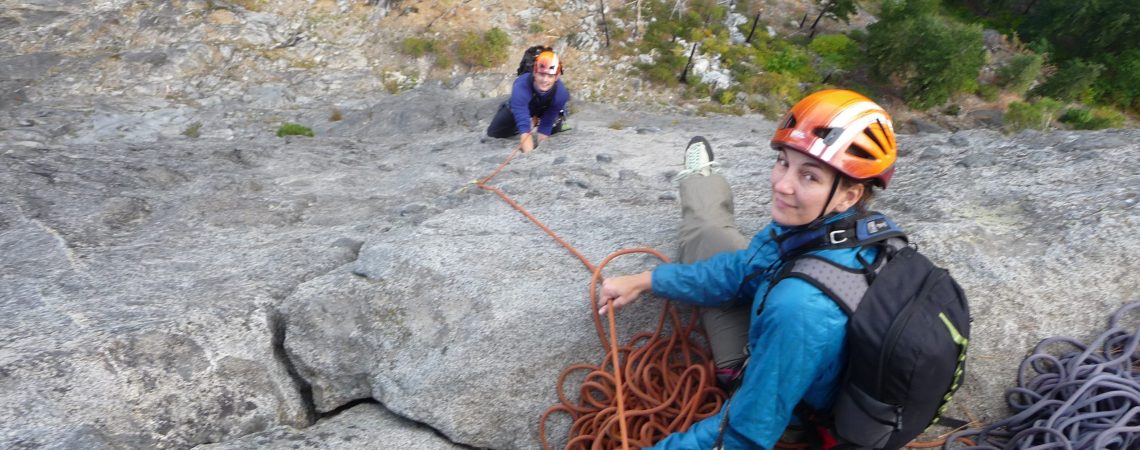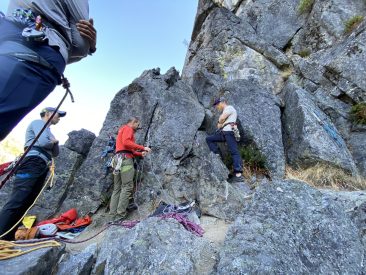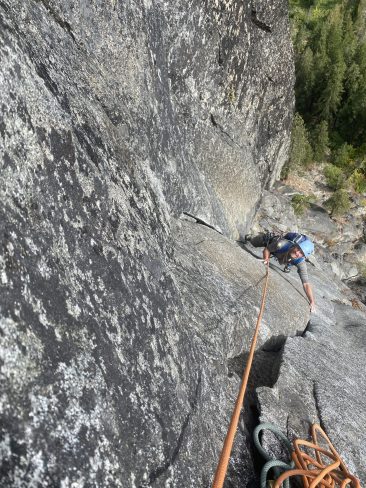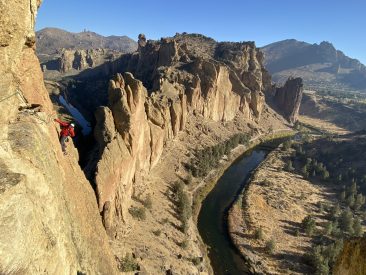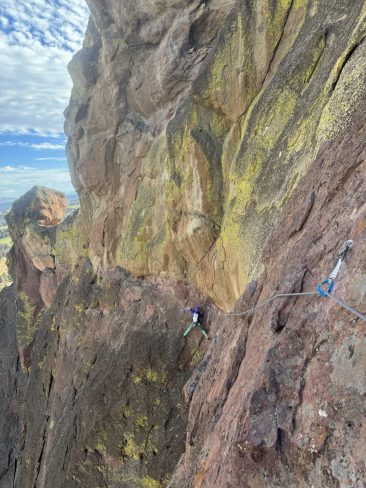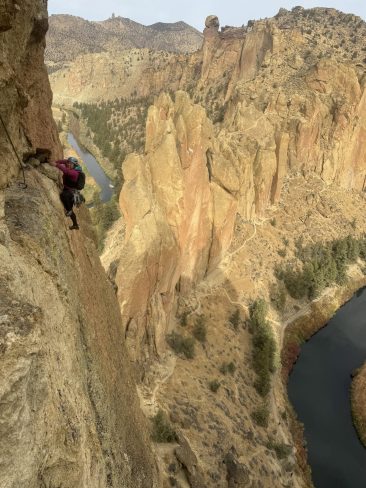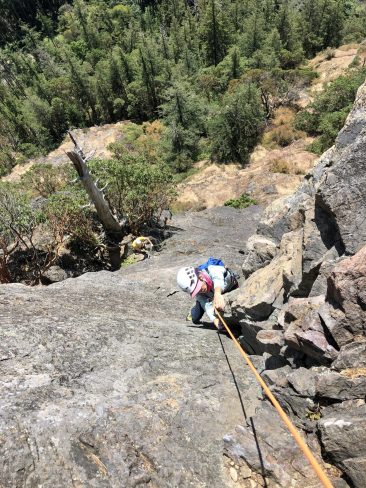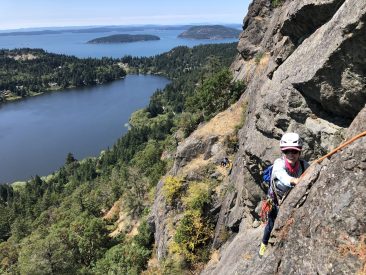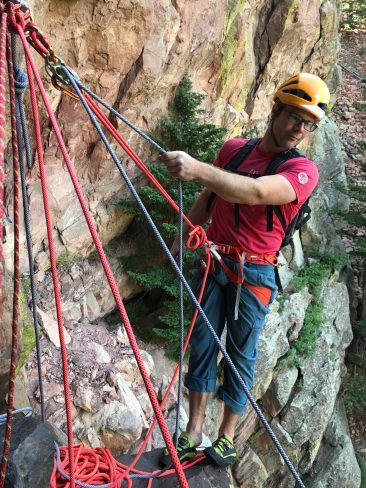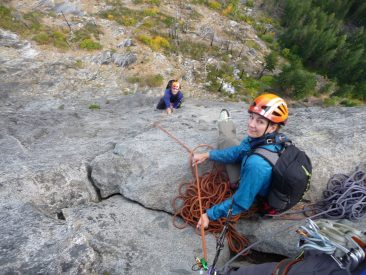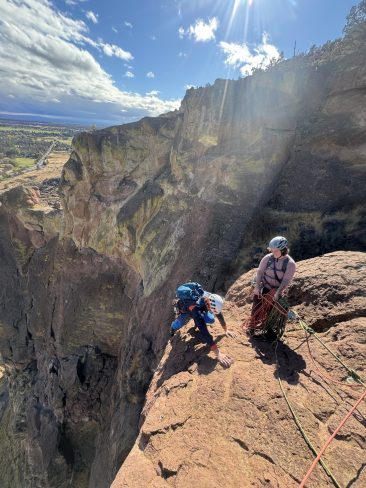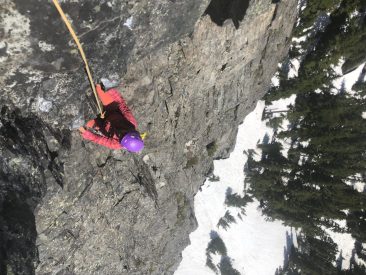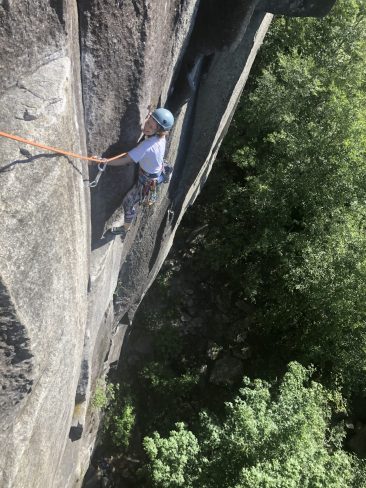
- Dates: Custom, call or email for availability
- Duration: 2 days
- Level: Intermediate (some previous) trad climbing experience
- Client Ratio: 2:1
- Cost:–Per Person based on 2 people per trip
- 2 Day – $600 (2:1 minimum)
- Included:Park fees, group climbing equipment, and guide services.
- Not Included:Ground transportation, restaurant meals, gratuities for guides
- Partners with Vertical World to bring Outdoor Climbing Skills to the Gym Experience! Designed for climbers looking to take their skills to the next level, this two-day course focuses on the fundamentals of multi-pitch climbing. Participants will learn essential techniques for climbing longer routes efficiently while emphasizing safety, rope management, and team communication. Key skills covered include multi-pitch belay transitions, anchor building, belaying from above, and efficient lead and follower techniques. The course also includes instruction on route planning, risk assessment, and multi-pitch rappelling, equipping climbers with the knowledge and confidence to tackle more advanced objectives.
What You’ll Learn:
- Multi-pitch belay transitions and rope management.
- Efficient lead and follower techniques for longer routes.
- Anchor building and stance management in multi-pitch settings.
- Belaying from above and belay station organization.
- Rappelling techniques, including multi-pitch rappels.
- Route planning, risk assessment, and decision-making for multi-pitch climbs.
ITINERARY
Day 1: Skills Development & Multi-Pitch Climb
The course begins with an introduction, a gear check, and a discussion on trip planning. Participants will then learn the fundamentals of multi-pitch systems, including belay transitions, rope management, and anchor building. They will also practice belaying from above and managing followers efficiently. Additionally, the morning session will cover route selection, risk assessment, and decision-making strategies.
In the afternoon, participants will apply these skills on a guided multi-pitch climb, focusing on efficient transitions and team communication. They will also learn and practice multi-pitch rappelling techniques and descent strategies. The day will conclude with a debrief and discussion of key takeaways.
Day 2: Application & Advanced Multi-Pitch Climbing
The second day will begin with a review and refinement of the techniques learned on Day 1. Participants will engage in route selection and independent trip planning while also discussing efficiency tips for climbing longer routes.
In the afternoon, participants will complete a full multi-pitch climb, applying their skills in a real-world setting. The emphasis will be on self-sufficiency, efficiency, and decision-making. They will also practice multi-pitch rappelling and descent management. The course will conclude with a final debrief and personalized feedback to help each climber continue their progression.
INTRO TO MULTIPITCH ROCK CLIMBING EQUIPMENT LIST
Our recommended clothing system has four layers.
Base layer: manages moisture and wicks perspiration away from your skin. (synthetic or merino wool)
Softshell: should be a durable, comfortable, insulating and wind/water resistant layer that breathes well.
Hard shell: windproof, waterproof and breathable. (e.g. Gore-Tex, or similar)
Insulating layer: should be down-fill or synthetic-fill and fit over all layers. (e.g. down, primaloft or polarguard)
These four layers are usually sufficient for most people, but if you tend to be colder bring one extra medium-layer that would be ideal for extra warmth around camp, such as a vest. When deciding what to pack, remember to bring enough clothes and accessories to ensure your safety and comfort, while not over-burdening yourself with items you probably won’t use.
Climbing Gear
- Climbing Helmet: Lightweight
- Rock Climbing Harness: Padded and adjustable.
- Rock Shoes
- Autblocking Belay Device: Petzl Reverso or similar
- ABD (Auto Blocking Belay device) such as a Petzl GriGri (Optional/recommended)
- Cord: 6-7 mm, 18-21 feet
- Nylon Slings: (1) 60 cm nylon sling, (1) 120 cm nylon sling
- 3-4 Locking carabiners 2-Larger, pear-shaped carabiners;
- 1-2-smaller pear-shaped, screw gate locking carabiners.
- 3-4 Non-locking carabiners
- Approach Shoes: (Optional/recommended)
Upper Body
- Synthetic T-shirt
- Light Fleece (like a Patagonia R1 or similar)
- Sunshirt (Optional/recommended)
- Light weight windshirt (Optional/recommended)
- Mid-Weight Down/Synthetic Jacket (with hood)
- 1 Pair light leather palmed gloves for warmth and rappelling
- Shade hat or baseball cap
Lower Body
- 2 Pair heavy wool/synthetic socks Check boot fit with liner and wool socks on
- 1 Pair lightweight long underwear Polypropylene or Capilene
- 1 Pair soft shell pants Schoeller fabrics
- 1 Pair nylon shorts For July/Aug, running shorts or other quick-drying type, not cotton!
- Gaiters Make sure they will fit over your boots.
Backpack
- Cragging pack 2500-3500 cubic inches or 30-45 liters
- Smaller multipitch pack 15-20L (Petzl Bug, Black Diamond Bullet pack or similar)
Miscellaneous Equipment
- Sunglasses 100% UV protection with side shields or wrap around.
- Personal first aid repair kit Basics: moleskin/blister kit, Band-Aids, first-aid tape, ibuprofen, personal medications, and batteries etc.
- Lip balm At least SPF 20
- Sunscreen At least SPF 40
- Headlamp lightweight LED
- 2 water bottles (or the ability to carry 2-litters of water)
- Favorite snacks
30 days or less – 100% of trip cost
WHAT HAPPENS IF BC ADVENTURE GUIDES HAS TO CANCEL MY TRIP?
In the rare circumstance where we need to cancel a program you can reschedule without a fee or receive a refund on your deposit. If circumstances arise that force us to cancel a program that is already in progress, we reserve the right to decide whether a refund or credit, at a prorated rate, will be issued. We are not responsible for cancellation fees or costs arising from your changed or cancelled flights, lodging, or other arrangements. We strongly recommend obtaining trip cancellation insurance from your travel agent.


